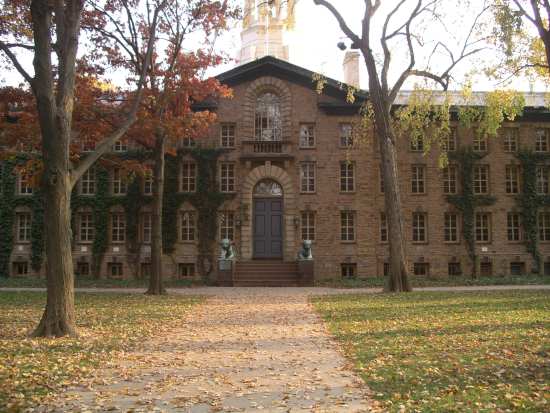
By Joe Sinagra | The Save Jersey Blog
You may have heard that students are refusing to repay their federal student loans as part of a protest designed to pressure the government into forgiving their debt, Save Jerseyans.
The problem? College graduates and students who default on their loans can lose their paychecks, tax refunds, or a portion of their Social Security benefits further down the road. Not paying back that debt can also ruin their credit, making it difficult to buy a house, car or even land a job. Interestingly, a large percentage of these Federal loans are encumbering seniors. Around 3 percent of U.S. households that are headed by a senior citizen now hold federal student debt, comprised largely of debt they took on to finance their own educations according to the GAO.
These are people who went to college, earned a degree and made decent money during their careers.

Graduates who earned master’s degree years ago have seen their finances dwindle away by illness, divorce, the cost of raising children, the housing bust, and the economic downturn and now want their loans forgiven because they can’t afford to pay them. The GAO report goes on to say that “[a]s the baby boomers continue to move into retirement, the number of older Americans with defaulted loans will only continue to increase.”
The cycle shows no signs of letting up. Younger graduates want a degree and have no problem doing whatever they need to do to obtain it, but now that it is time to pay the piper, they balk at the idea that they now have to pay back these loans. They say they can’t afford to pay the funds back because the economy is bad and they can’t get a good job. Well,Save Jerseyans, the economy has been bad for quite a few years now and I would think an educated person at some point would realize that their bills are getting higher and they need to stop accruing more liability and figure out how they are going to pay off their current obligations.
Since 2008, companies having been paying less for positions that previously were paying a lot more. It didn’t happened overnight, and it doesn’t take a rocket scientist to know that if 300,000 students looking to obtain a high paying position in a limited field, not everyone is going to get hired.
To be fair, there is a lot of misinformation out there peddled by self-interested for-profit institutions. Colleges feel they have no obligation to tell students that there aren’t that many openings for that high paying position students expect to get and many of them once graduated won’t get hired because somebody else beat them to it. Now students feel cheated because they have a $150,000 obligation and no way to pay it back; they need the money from the lesser paying job to live on.
New Jersey, by the way, ranks eighth in the country in terms of the highest amount of loan debt owed by its graduates.
Sixty-four percent of New Jersey’s graduates carried student loan debt and, in just New Jersey alone, more than 1.2 million people owe $30 billion in student loans.

On graduating from a four-year degree-granting college or university in New Jersey, the average graduate who received a bachelor’s degree also got a notice to start paying off an average of $30,000 in loans. Almost two-thirds of all graduates in the state left college with some sort of debt.
In 2011, Centenary College in Hackettstown all of its graduates left in debt. This may come as a surprise but one school that made the list with the lowest debt loads was Princeton University.
I disagree with those who say that a college degree no longer holds a justifiable value. It is still the best avenue to take in finding a job in many industries, but one should be realistic in what they expect to gain out of it particularly when it comes to selecting a school, major, and projected debt load. By 2020, 66 percent of the jobs in our state will require a certificate or a degree, while only 46 percent of the current population has one.
What’s wrong, in my opinion, is to have others who decided they couldn’t afford college and expecting them take up the slack to pay back the debt created by those who felt they needed that master’s degree.
Those that took jobs because they knew they couldn’t afford the price of college are going to be expected to pay for those graduates who want their loans forgiven. Somebody has to foot the freight either the students or the taxpayers, and as future taxpayers those same students will still pay.
This is the reverse of sharing the wealth, and I certainly don’t want to share someone else’s debt.
There are no free rides in life and if you want to ride around in a Mercedes or BMW, don’t expect those in a Nissan Versa to pay it off for you.
_______



Hell no. Why should responsible taxpayers pay for someone’s bad judgment? Instead, students should sue colleges for selling them overpriced and nonfunctional crap, exactly as one would sue for a lemon car.
No!!
Rather see money going to help Americans first vs any other Country!! The US could wipe out its own debt if it took care of America first!! Reward those
paying it! Try much lower interest rates!!
Not saying to wipe away defaults, otherwise it’s just like people walking away from responsibility while the rest pay their mortgages.
If the government ‘cleans the slate’, the deficit rises as does debt service meaning something more then $.65/$ received in taxes can be used to run the US of A while something more the $.35/$ received pays debt service. Hell no! Affording college is a main consideration when deciding to go in the first place. Kids should be educated where they can afford to go!
“Forgiving debt” actually means passing that debt on to someone else, in this case the taxpayer.
State colleges with low pass rates should be first. Pay off those who completed in four years. It may be a few but it will look good at election time.
NO! Not everybody needs college. And they are way overpriced and overrated. A cash cow for the Beauracracy. over paid professors and speakers. college has become like healthcare, a big bloated mess
No. You choose to go, you pay for it. N
So you’d rather money go overseas!! How American is that! Lower interest rates!! How dare the US overcharge students interest rates yet the send free money overseas!!! Thats despicable!! No one is asking for a free ride!! Why charge up to 7% interest??? No justification!!! How about 0 interest or 1% interest College loans for Americans ?? What’s wrong with that???
Considering the federal government only lend out credit and not actual money with student debt then I guess it can be forgiven with no actual effect on the economy. Same thing goes for mortgages. because of fractional reserve banking, banks don’t actually lend out money.
Absolutely not
Is this a trick question?
Please don’t use, “discuss”. We are not in class.
yes here’s one reason: Obama okays AL Sharpton not paying back income taxes of @$5..5 million so why shouldn’t college and graduate education be paid for by Uncle Sam!
All or nothing. Everyone or no one. The only fair way.
Nope. Just another populist government solution to cure the unintended but foreseeable consequences and problems caused by prior populist government programs which were implemented to cure the unintended but foreseeable consequences and problems caused by prior populist government programs.
no the government has no business in college student affairs
Why should anyone pay a debt except for the person who incurred the debt? Should debt be selectively wiped out, letting the government be the one to decide who can afford to pay back debt and who can’t? Should all college debt be wiped out up to a certain point and just add that to the national debt?
Maybe we need to start by asking why people are accumulating massive debts for college and the place to start might be with tuition rates. A chart that tracks tuition says Rutgers tuition in 1995 was around $3700/yr. (This is tuition not room and board). This year, it is over $13,700. Major private universities that might have been $5000/yr in the 80s can now be over $60,000. What has caused this spike in tuition? And what are colleges doing with the money? Before the discussion even gets near talking about why the public should take on the burden of unpaid college debt or fund public college tuition (because that is where the discussion is going) we need to take a good look at why colleges cost what they do and why a masters degree can come with a quarter million dollar price tag.